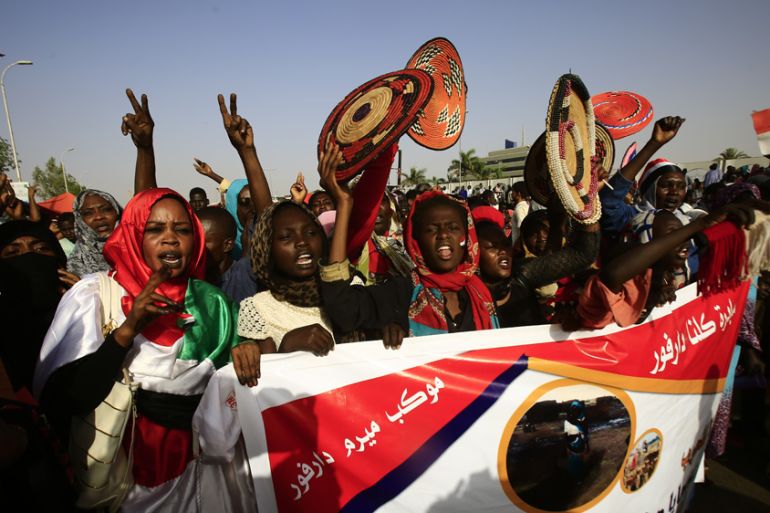Opposition demands Sudan join ICC as talks held on civilian rule
Comments by former PM Sadiq al-Mahdi come as a committee representing the military and protesters hold first meeting.

A top opposition leader called on Saturday for Sudan to join the International Criminal Court (ICC) that has indicted former president Omar al-Bashir, as a panel of protesters and the military met to discuss civilian rule.
Sadiq al-Mahdi, a former prime minister and head of the opposition National Umma Party that has backed the protests, also told reporters the army’s removal of Bashir was “not a military coup”.
His comments came as a joint committee representing the ruling military leadership and protesters held their first meeting to discuss a demand by demonstrators for a handover to civilian rule.
Rashid al-Sayed, a spokesman for the protest movement, said the meeting was a confidence-building step between both sides who are “partners in the revolution” and a second round was due later on Saturday.
He said the military council vowed at the talks that a protest camp outside army headquarters “will not be dispersed by force”.
A negotiator for Sudan‘s opposition alliance said after the talks that he expected agreement over the formation of a new body to lead the country’s transition.
“Today, we have taken positive steps and we expect to reach an agreement satisfactory to all parties,” said Ayman Nimir, a negotiator for the Declaration of Freedom and Change Forces.
“We expect to receive a response from the military council regarding the formation of a sovereign council within hours.”
Shams al-Deen al-Kabashi, the spokesman for the military council, said the talks were “transparent”.
“We are very optimistic that we will reach a final conclusion that will be announced to the Sudanese people as soon as possible,” he told a brief press conference.
War in Darfur
Al-Bashir was deposed by the army on April 11 after months of protests against his three-decade rule.
|
|
Thousands of demonstrators reached the sprawling military headquarters in central Khartoum on April 6, demanding the army support those opposing against al-Bashir.
Five days later, the army toppled al-Bashir but then took power into its own hands through a 10-member transitional military council.
The protesters, who have kept up the pressure around-the-clock outside army headquarters for weeks, are now demanding the council step down and make way for a civilian government. Demonstrators fear Islamists and other factions close to the deposed leader, who is now jailed in the capital Khartoum, will be granted a role in the transition.
Mahdi said Sudan should “immediately” join the Hague-based ICC where al-Bashir is wanted for genocide, war crimes and crimes against humanity for his alleged role in the conflict in Darfur.
“This should be done in coordination with the transitional military council,” he added.
Al-Bashir, 75, has consistently denied the charges against him.
The war in Darfur erupted in 2003 when ethnic minority rebels took up arms against Khartoum’s Arab-dominated government, accusing it of social and political marginalisation.
The United Nations says about 300,000 people have died in the conflict with another 2.5 million displaced, many still living in miserable camps across the western region of the country.
Al-Bashir swept to power in an Islamist-backed coup in 1989 that toppled Mahdi’s elected government.
‘Regime still present’
Mahdi said on Saturday the president’s supporters remained in place despite the upheaval.
|
|
“The head of the regime has been ousted but the regime is still present,” Mahdi said.
“The toppled regime might still try to do a coup,” he said without elaborating.
Protest leaders have held several rounds of inconclusive talks with the military council since al-Bashir was deposed.
Earlier this week, the two sides agreed to set up the joint committee to chart the way forward.
The military council has so far refused to step down, insisting it has assumed power for a two-year transitional period.
Western governments have expressed support, but Sudan’s key Gulf Arab lenders have backed the military council, while African states have called for more time for the army to hand over to civilians.
As protesters were pushing the military on civilian rule Saturday, assailants hurled rocks at a meeting of members of the Islamist Popular Congress Party, an ally of al-Bashir’s, injuring 32 of them.
“When the participants in the meeting took a break, they came under attack from a group of people who threw rocks,” said Suheir Salah, the party’s deputy undersecretary.